Not all plastic bottles can be safely reused or recycled 89%

The Hidden Truth About Plastic Bottles: Not All Are Created Equal
As we continue to navigate the complex world of sustainability and environmental conservation, it's essential to debunk common myths surrounding plastic bottles. While many of us are well-intentioned in our efforts to reduce waste and promote recycling, the truth is that not all plastic bottles can be safely reused or recycled.
The Problem with Plastic Bottles
Plastic bottles come in various shapes, sizes, and materials, each with its unique properties and purposes. However, when it comes to reusing or recycling them, the rules are not always clear-cut. In fact, some plastic bottles may even pose a risk to our health and environment if not handled properly.
What Makes a Plastic Bottle Reusable or Recyclable?
Before we dive into the specifics, let's take a closer look at what makes a plastic bottle reusable or recyclable. Here are some key factors to consider:
- Made from PET (polyethylene terephthalate) or HDPE (high-density polyethylene)
- Have a clear label with a recycling symbol (#1 or #2)
- Are clean and free of contaminants
- Are not mixed with other types of plastic
The Dark Side of Reusing Plastic Bottles
While reusing plastic bottles may seem like an eco-friendly alternative to single-use plastics, there are some crucial considerations to keep in mind. For instance:
- Some plastic bottles may contain BPA (bisphenol A) or phthalates, which can leach into water and pose health risks
- Reusing plastic bottles without proper cleaning and sanitizing can lead to the growth of bacteria and other microorganisms
- Using plastic bottles for storing food or drinks that are not intended for consumption in those containers can be hazardous
The Limitations of Plastic Recycling
Despite our best efforts, plastic recycling is often a complex and imperfect process. In fact, it's estimated that only about 9% of all plastic waste ever produced has been recycled. This means that the majority of plastic bottles end up in landfills or oceans, causing irreparable harm to our environment.
Conclusion: A Call to Action
In light of these findings, it's clear that not all plastic bottles can be safely reused or recycled. As consumers and advocates for sustainability, we must take a more nuanced approach to reducing waste and promoting environmental conservation. By being aware of the complexities surrounding plastic bottles and taking steps to reduce our reliance on single-use plastics, we can make a real difference in protecting our planet for future generations.
- Created by: Nathan Mercado
- Created at: Aug. 30, 2024, 10:25 p.m.
- ID: 8576








